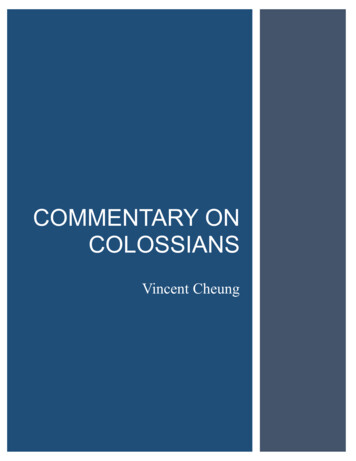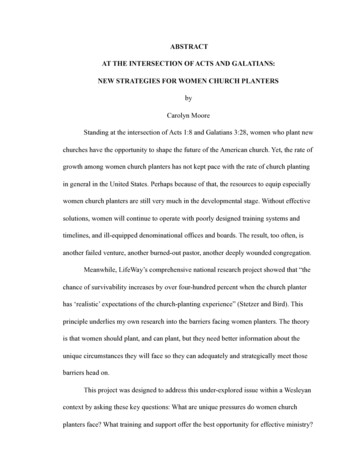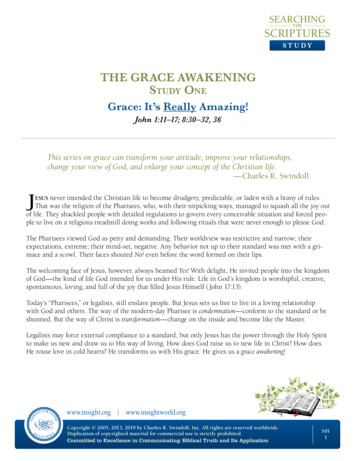
Transcription
COMMENTARY ONGALATIANSVincent Cheung
Copyright 2007 by Vincent Cheunghttp://www.vincentcheung.comAll rights reserved. No part of this publication may be reproduced, stored, or transmittedwithout the prior permission of the author or publisher.Unless otherwise indicated, Scripture quotations are taken from the HOLY BIBLE, NEWINTERNATIONAL VERSION. Copyright 1973, 1978, 1984 by International BibleSociety. Used by permission of Zondervan Publishing House. All rights reserved.2
CONTENTSINTRODUCTION . 4GALATIANS 1:1-5 . 5GALATIANS 1:6-10 . 11GALATIANS 1:11-12 . 19GALATIANS 1:13-24 . 23GALATIANS 2:1-10 . 27GALATIANS 2:11-14 . 48GALATIANS 2:15-21 . 60GALATIANS 3:1-5 . 72GALATIANS 3:6-9 . 83GALATIANS 3:10-14 . 88GALATIANS 3:15-18 . 91GALATIANS 3:19-25 . 94GALATIANS 3:26-4:7 . 96GALATIANS 4:8-20 . 99GALATIANS 4:21-31 . 102GALATIANS 5:1-12 . 104GALATIANS 5:13-26 . 107GALATIANS 6:1-10 . 110GALATIANS 6:11-18 . 1123
INTRODUCTIONMany of the New Testament documents are occasional letters. This means that they werewritten in response to some definite questions, problems, and circumstances that werepresent at the time. As Paul writes his letter to Galatia, the church there has been infiltratedby false teachers, or Judaizers. They have started to persuade the converts that in order tobe right with God, in order to be saved, it is necessary for them to become Jews. This entailssubmission to the rite of circumcision and to the law of Moses. Moreover, in the processof turning the Galatians away from the gospel, it appears that these false teachers haveintroduced doubt regarding Paul's qualifications, authority, and motive. Therefore, in hisdefense of the gospel, the apostle must also defend his ministry.Paul realizes that in adopting the doctrine of the Judaizers, the Galatians are turning awayfrom the gospel that was first preached to them. This is the message of justification by faithalone – that is, a person is made righteousness according to the divine standard onlybecause of God's sovereign grace and Christ's atoning work apart from human lineage,decision, and effort. Since this message is pivotal to salvation, and one that divides truereligion from false religion, Paul writes his letter to provide a corrective on this urgentmatter.Besides the fact that it is the product of divine revelation, the enduring significance of thisletter is ensured by several factors. First, it gives a clear statement of the core of the gospel,that we are saved through faith in the person and work of Jesus Christ, a faith that comesas a sovereign gift from God, and not through obedience to the law or the effort of the flesh.Second, it defines for us the place that this teaching has in the spectrum of biblicaldoctrines, and in fact, in the spectrum of all the ideas ever introduced to humankind. Thethird point closely follows the second, as the apostle models for us the kind of fiercevigilance with which we must guard this doctrine, the ultimate curse with which we mustattack and condemn its detractors, and the harsh reprimand with which we must admonishthose who stray from it. In all of this, the apostle exhibits a number of assumptions thatalso carry significance for our doctrine and ministry.4
GALATIANS 1:1-5Paul, an apostle -- sent not from men nor by man, but by Jesus Christ and God theFather, who raised him from the dead – and all the brothers with me,To the churches in Galatia:Grace and peace to you from God our Father and the Lord Jesus Christ, who gavehimself for our sins to rescue us from the present evil age, according to the will of ourGod and Father, to whom be glory for ever and ever. Amen.This opening passage foreshadows the personal and doctrinal issues that Paul will addressin the body of his letter.We do not know the exact words the Judaizers used to undermine Paul's ministry, but wecan infer from his response some of the things that they might have said. He asserts that heis an apostle "sent not from men nor by man, but by Jesus Christ and God the Father." It islikely that at the very beginning of his letter, he wishes to counter one of the accusationsagainst him, that he is in fact not an apostle, or that he derives his authority and messagenot from Christ, but from mere men. So he begins by taking a firm stand regarding hisministry.As one of the apostles, he has direct authorization from Christ to make definitive doctrinalpronouncements and the power to exercise church discipline. The Galatians did not hearthe gospel from an inferior, unreliable, or even a secondhand source, but from anauthoritative messenger sent directly by Jesus Christ and God the Father. At this point, theemphasis is on the authenticity and authority of the messenger and not the message. Thelatter will come up soon enough, and since Paul will say more about this, we will reserveadditional comments for later.He is an apostle sent neither "from men nor by man" – that is, he derives his authorityneither from a group of men nor from an individual man. It is true that men have placedtheir hands upon him and sent him off to preach the gospel (Acts 13:3), but it was the HolySpirit who called him out. It is on the basis of this divine commission and not any humanrecognition that Paul asserts the validity of his ministry. Indeed, as far as humanrecognition is concerned, his ministry is not universally accepted. This is one of thechallenges that he would face time after time in his ministry, for example, not only here inGalatians, but also in his letters to the Corinthians.There is a lesson here for how Christians should regard their ministers and how ministersshould regard themselves. Although denominational ordinations, seminary degrees, andapprenticeships under prominent leaders often have something to do with the spiritualequipping of a minister and could add to a person's credibility in the eyes of men,5
credentials from a human institutions or individuals can never impart the authority andpower that come from a divine call.If a minister thinks that he is authorized to preach because he has received credentials fromhis denomination, then what happens when he has to face a congregation that belongs toanother denomination, and especially one that rejects the authority of his own? It is not thedenominational credentials that undermine his ministry, but it is his conscious reliance onthem that is self-defeating.Then, most of us know what happens with seminary degrees. When a person claimsexpertise because of his seminary degree, the matter does not end there, but we are alsointerested in the institution that he attended. And if it is a seminary that is known fordoctrines and practices that we find objectionable, it becomes easy to dismiss the personbefore we find out anything more about him. So a minister who thinks that he speaks withauthority because he has a seminary degree faces a similar problem as one who dependson his denominational credentials. He appeals to things that have no spiritual authority inthemselves, and he allows people to sweep him into narrow cliques so that those on theoutside find no reason to pay him any attention.Church credentials, seminary degrees, human endorsements, letters of recommendations,and so on, all have their roles. Some may even regard ordination as a means of grace.However, one can exercise the full power and liberty that come from the divine call onlyif he ministers on the basis of that divine call. This does not mean that people will alwaysrecognize the calling and authority given to a person, as in the case of Paul. But if he relieson human credentials, then even in principle his authority is reduced to that level andnarrowed to that range. On the other hand, a divine mandate authorizes a person to functionin any type of situation to which God sends him.It misses the point to think that the above makes it impossible to select, promote, orexamine a person for the ministry – we have been talking about a different question. Whenit comes to this other issue, the New Testament includes several passages listing the publicqualifications for the ministry (e.g. 1 Timothy 3:1-7), which we will not discuss at thistime. In short, they pertain to a person's lifestyle, character, doctrine, and competence.Turning from the personal to the doctrinal aspect of the passage, the controversy concernshow a person becomes righteous and acceptable before God. Must he follow the law ofMoses, Jewish traditions, or submit to circumcision? The immediate issue is not evenwhether it is good to become circumcised, to follow the law of Moses, or to obey any lawof God, but whether this is the way to become righteous in God's sight. This distinction isimportant in order to maintain the gospel of grace and at the same time excludeantinomianism. For if as a matter of principle it is against grace to keep God's law or toobey God's command, then grace would indeed lead to sin. But this is not the gospel thatPaul preaches.Again, the question is how a person becomes righteous, justified, and acceptable beforeGod. The topic will receive ample attention in the body of the letter, so we need not spend6
time on it here. What we have in this opening passage is a positive statement of the apostle'sdoctrine, doubtless given in anticipation of what follows, but that is also informative initself.Paul writes that Christ "gave himself for our sins." How is this relevant? Here is an exampleof how a positive statement about the gospel counteracts a false gospel, or how sounddoctrine excludes its distortion. We are "rescued" because Christ "gave himself," and notbecause of our works or merits. To merely draw attention to this, that this is the gospel,should settle the issue. This is because, as Paul will soon point out, "if righteousness couldbe gained through the law, Christ died for nothing" (Galatians 2:21). That is, the idea that"righteousness could be gained through the law" is antithetical to the sacrifice of Christ, sothat they exclude each other. However, to be a Christian is to affirm that Christ "gavehimself for our sins," and therefore, that "righteousness could be gained through the law"cannot be part of the Christian gospel, nor is anyone a Christian who affirms thatrighteousness is obtained this way.This simple principle also speaks to today's controversies surrounding the doctrine ofjustification. In fact, the statement that Christ "gave himself for our sins to rescue us"should settle most questions and refute most heresies related to this doctrine. That is, anyteaching that denies the necessity or the sufficiency of Christ's sacrifice, even if byimplication, cannot be the Christian gospel. And as Paul declares in the next passage, noone who teaches or affirms such a teaching can be a Christian. A person cannot be aChristian and at the same time affirm or practice something that renders Christ's sacrificeunnecessary or insufficient.Thus in this introductory passage, Paul encapsulates his answer to both the personal andthe doctrinal aspects of the controversy. The rest of the letter contains specific argumentsand explanations.It is sometimes said that Paul is not a systematic thinker. It depends on what a person meansby this as to whether or not we should accept the statement. If it means that his writingsare occasional, so that he does not leave us with a body of doctrine presented as a system,then this is true in a sense, although we cannot accept even this without qualification.However, if it suggests that Paul is a purely pragmatic thinker, coming up with solutionsas problems arise without an existing, extensive, organized, and self-consistentunderstanding of God's mind, or if it suggests that any part of Paul's writings contradictsor even appears to contradict another part, then the statement is false.Although we may agree that Paul has written no systematic theology as such, and certainlynot a textbook on the subject, in his mind he indeed affirms a system of theology that standsbehind all of his sermons and letters. In fact, my exposition on Acts 17 points out that hisspeech on Mars Hill follows an outline that is almost identical to the arrangement of ourtypical systematic theology,1 touching on the doctrines of revelation, theology proper,creation, providence, anthropology, ethics, christology, soteriology, and eschatology. Thisis not a coincidence, but it is because the topics logically and naturally lend themselves to1See Vincent Cheung, Presuppositional Confrontations.7
such an arrangement in thinking and presentation.2 In philosophical terms, the same outlinewould address the topics of epistemology, metaphysics, religion, biology, history, andethics. Moreover, that speech exhibits a logical order in which one point follows from theprevious one, and each one is related to all the others.The necessary conclusion is that Paul is a systematic theologian, although this fact isobscured by the occasional nature of his letters. Or to put this in a much more accurateway, those who wish to find an excuse to assert their own theories and agendas exploit theoccasional nature of these letters in order to deny the systematic structure and content ofthe apostle's thinking.For a discourse to be occasional means that there is a context, and when a person addressesan audience who shares a common context, it is natural and often more efficient to assumethe context and address only the problems and disagreements, rather than to begin "fromscratch." Just because most of Paul's writings are occasional does not mean that he isprimarily a pragmatic thinker or that he invents doctrines to match the solutions as the needarises. Instead, he explains and develops the relevant aspects of his system of theology, andthen he applies them to the current situation. Not only does his occasional letters containextensive doctrinal expositions, but behind everything that he writes is a completetheological system. There are strong indications of this in our passage, even though it isonly an introduction to a letter.Several times Paul acknowledges God and his divine fatherhood. Then, he puts God theFather and Jesus Christ on the same level, and at the same time distinguishes the two.Although he does not mention the Holy Spirit, he acknowledges the Trinity elsewhere inhis writings, and he is consistent with the doctrine here. He says that he is sent "not frommen nor by man, but by Jesus Christ and God the Father," implying that Christ is morethan a mere man, but on the level with God the Father, who has the right and power to sendhim forth as an apostle.Redemption was accomplished "according to the will of our God," signifying that salvationis effected by the gracious purpose and providence of a sovereign God. By his will, Christ"gave himself for our sins." Here we find the ideas of sin, of punishment, and of vicarioussacrifice, or the doctrine of the atonement. Both the justice and mercy of God are embeddedin the above. After Christ sacrificed himself, God "raised him from the dead," so that theresurrection is included here as well.The work of Christ has "rescued us from the present evil age." The language refers not toa removal from something, but a deliverance from its power. Although Christians remainin this world after their conversion, they have been delivered from slavery to the power ofsin. Here Paul makes ethical applications out of eschatological categories. Heacknowledges a "two age" division between the present and the future, but the coming ofChrist has ushered in the kingdom of God, so that the very powers of heaven reside inbelievers even now. An entire book could be devoted to this point alone. We may also see2See Vincent Cheung, Systematic Theology.8
a contrast between the "present evil age" and the "for ever and ever" of God's glory andpower.Thus most of the loci of a complete systematic theology is either mentioned or assumed inthese first five verses of the letter. It is true that one must bring with him some of the detailsfrom other parts of Scripture to fully perceive and appreciate these doctrinal assumptions.But the fact that the assumptions are here means that these doctrines are ingrained in theapostle's thinking, and that he stands on this foundation as he writes to the Galatians.Like his other writings, the letter to the Galatians is an expression and application of thissystem of theology, so that it is adapted to the need at hand. However, when the commoncontext is taken away, and when he has to present the Christian faith "from scratch," as inhis speech on Mars Hill, then we see that Paul is indeed a systematic theologian, asystematic thinker. Again, there in Acts 17, where his audience is unfamiliar with thebiblical doctrines and thought categories, he follows an arrangement that resembles ourtypical systematic theology outline.Those scholars who regard Paul as merely a pragmatic thinker and not a systematic one errin examining the question from the wrong end. Whereas Paul in fact possesses an extensiveand coherent system in his mind, and his letters contain his expression and application ofthis, these scholars examine his writings without considering the kind of mind thatproduced them. Just because a piece of writing is not a systematic theology does not meanthat its author is not a systematic theologian or that he has no system of belief in his mind.For example, although I have written a systematic theology and consider the subject themost important course of learning for a believer, I often write sermons, commentaries,position papers, and responses to questions and objections about the Christian faith, andalmost none of them will read like a systematic theology, since they are occasional. But asystem of theology is so ingrained in my mind that, whether consciously or unconsciously,everything that I speak or write is in fact an expression and application of this system.3 Andinsofar as I am a consistent thinker, all of my writings should conform to this system. Thisis a key to interpreting a writer's materials. If you grasp a person's system of thought, youare more likely to correctly understand what he means when he applies it. In fact, in manycases, you should be able to predict what he will say on a subject.The ideal is that every detail of a person's system conforms to that system of thought thatis in Scripture. The honest and competent theologian will, of course, seek to resolve anyanomaly in favor of what Scripture actually teaches, even if he must discard his previousbeliefs to do this. To the extent that the system of theology in his mind is derived from andcorresponds to that which is taught in Scripture, this person's thinking is synchronized withthe mind of Christ, and he is qualified to address the issues and questions that he faces asa believer and as a minister.3See Vincent Cheung, Systematic Theology, Ultimate Questions, Presuppositional Confrontations,Apologetics in Conversation, The Author of Sin, and Captive to Reason.9
Paul leaves us an example to follow if we were to become mature thinkers. That is, wemust obtain a comprehensive and coherent understanding of the system of thought that isrevealed in Scripture, and formulate the various doctrines in our minds in a way thatexhibits perfect harmony, excluding all traces of contradictions and paradoxes. Then, wemust learn to fluidly apply this system in our daily conversations, as we preach the gospel,as we debate unbelievers and answer heretics, counsel fellow Christians, resolve ethicalquestions, and so on.Like Paul, when we are applying this system of thought, there is no need to always refer toit in a prescribed arrangement, but what we speak or write should demonstrate a logicalinterplay of the biblical doctrines, deftly blending them together to produce an answer asif it comes straight from the mind of Christ to address the situation at hand. Then, of course,if the situation demands that we summarize the entire Christian faith in a logical order andwithout being confined to a narrow context, we should be able to do that as well.10
GALATIANS 1:6-10I am astonished that you are so quickly deserting the one who called you by the graceof Christ and are turning to a different gospel – which is really no gospel at all.Evidently some people are throwing you into confusion and are trying to pervert thegospel of Christ. But even if we or an angel from heaven should preach a gospel otherthan the one we preached to you, let him be eternally condemned! As we have alreadysaid, so now I say again: If anybody is preaching to you a gospel other than what youaccepted, let him be eternally condemned!Am I now trying to win the approval of men, or of God? Or am I trying to pleasemen? If I were still trying to please men, I would not be a servant of Christ.Some people compare reading an occasional letter to listening in to one side of aconversation that is already in progress. We are not privy to all that has occurred and allthat has been said up to this point in the controversy, and even now we are hearing onlyfrom Paul, and not from the Judaizers or the Galatians.This is why it is at times difficult to attain a precise understanding of some passages,although the problem is often exaggerated. The level of difficulty hinges on the level ofclarity with which the person expresses himself. This includes his language and the amountof information that he includes on his side of the conversation.Imagine if the only word we hear from a person on one side of the conversation is "Yes."Since we do not know the question or even the topic of the conversation, it is impossiblefor us to infer any useful information from this word alone. In this case, our lack of accessto the other side cripples our understanding of the conversation.But what if the person says, "Yes, I will meet you at the church parking lot tomorrowmorning to discuss the details." This does not only tell us that the person will meet someoneat the church parking lot tomorrow morning, but it also tells us something about thequestion to which this statement serves as a response. The two will meet to discuss "thedetails" about something that is most likely related to the topic of the current conversation.And if we could hear more from this person, even if only his side of the conversation, wewill probably also discover the topic, and what kind of details about this topic that theyplan to discuss the next day.In this case, having access to only one side of the conversation does not cripple ourunderstanding. In fact, we could obtain more information by hearing one side of theconversation from someone who speaks clearly and fully than we could by hearing bothsides of a conversation in which the people involved do not speak clearly and fully.11
Often, even if we cannot infer everything about the original context, we can still derive allthat we need to know from one side of the conversation. For example, we read in Paul'sletter to the Romans, "Therefore God has mercy on whom he wants to have mercy, and hehardens whom he wants to harden" (Romans 9:18). Without knowing whether this iswritten as a response to a question, objection, or argument, and without knowing whatpreceded the statement that warrants the "therefore," we can derive from this the universaltruth that "God has mercy on whom he wants to have mercy, and he hardens whom hewants to harden."Of course, the context can significantly alter the precise meaning and application of thestatement, but we have the entire letter to the Romans to tell us that, as well as the entirePauline corpus, the entire New Testament, as well as the entire Old Testament. Therefore,even though we have access to only one side of the conversation, nothing important to truthis lost here. Consider this point in relation to the doctrine of the clarity or perspicuity ofScripture.4Paul mentions the reason for his letter right away. At this point we are not provided withdetails about the problem, but the Galatians know what Paul has in mind. He begins byreferring to the issue in general terms, describing the problem and noting its consequences."Some people" are trying to "pervert the gospel," and to convince the Galatians to affirm"another gospel." We will be able to infer from the rest of the letter the nature of thedoctrinal perversion and this other "gospel" – what Paul says in this passage belongs to thatcontext, but there are some points here that demand universal application even apart fromit.Paul does not begin the body of his letter in the usual manner. He does not express gratitudeto God for anything good that he has wrought in the readers, nor does he offer prayer sothat God would enable them to make further progress. He does not commend his readersfor anything that they have performed, believed, or maintained. This departure from theusual form accentuates the urgency and agitation that would characterize the rest of theletter.Why is there this sense of urgency and agitation? It is because the Galatians are "turningto a different gospel – which is really no gospel at all." In other words, they are turningaway from the message that Paul preached to them to another that represents itself as thegospel. But this different message is not the gospel at all, and as this same passage pointsout, there is really no gospel other than the one that Paul preached to them.Paul stresses the exclusivity of the gospel from several angles. He writes that if "we"(including Paul himself), "an angel," or "anybody" should preach a different message tothem, then let that person be "eternally condemned." The variation on the message isdescribed in two ways: "other than the one we preached to you" and "other than what youaccepted."4See Vincent Cheung, Systematic Theology.12
That is, if anybody at all – including any apostle or any angel – preaches a message otherthan the one Paul preached to them, or to say the same thing, other than the one theGalatians first received, then that message is a false gospel, and may that messenger beeternally condemned. There is no room for any deviation, any modification, anymodernization, or any "improvement" to the original gospel message. There is no room forflexibility in its content. To say this in a positive way, this original message is accurate,precise, complete, and enduring, so that anything different from it is false doctrine.It is true that the present controversy has to do with justification by faith, but the abovemust not be limited to this area in its application. This is because of the universal andcomprehensive manner in which Paul asserts this principle of exclusivity. Paul preachedthe true gospel to the Galatians, and there is only one true gospel. Therefore, any deviationconstitutes false doctrine.All the elements in this exclusive path to salvation is fixed. A person cannot, withouteternal consequence to his own soul, remove anything in the Christian system of doctrinethat destroys the coherence of the gospel message. For example, one cannot make sense ofjustification by faith if the biblical teaching on sin is denied, rendering Christ's vicarioussacrifice and imputed righteousness unnecessary in the first place. Thus, in affirming thegospel that Paul preached to the Galatians, one must affirm what this message says aboutGod, Christ, sin, faith, and so on.Paul equates turning away from the message ab
it comes to this other issue, the New Testament includes several passages listing the public qualifications for the ministry (e.g. 1 Timothy 3:1-7), which we will not discuss at this time. In short, they pertain to a










